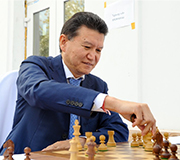 As the first decree as president of Kalmykia, I introduced chess as a compulsory subject in all schools. Over few years, students’ academic performance had increased by 40 percent, and the commission on juvenile affairs simply had nothing to do.
As the first decree as president of Kalmykia, I introduced chess as a compulsory subject in all schools. Over few years, students’ academic performance had increased by 40 percent, and the commission on juvenile affairs simply had nothing to do.
Among the 83 regions of the Russian Federation, Kalmyk schoolchildren came out on top. In 1995, when I became President of FIDE, I began to introduce the Chess in Schools programmes all over the world. I visited up to a hundred countries a year and organized chess lessons in each school. What for? It's just that this is the only kind of human activity that simultaneously develops both hemispheres of the brain. When you figure out which piece to move, your left hemisphere, which is responsible for logic and numbers begins to work actively. But you do not immediately move the piece, but calculate what will happen in 2-3 moves and then the right hemisphere, which is responsible for creativity and imagination, turns on.
The earlier the child starts playing, the faster it develops. In Armenia, Azerbaijan and Belgium the principals of schools told me that chess helped to improve academic performance and concentration. When we met with director of UNESCO Irina Bokova, she decided to make chess a fundamental point of the general educational cultural programme. And when, after eight years of imprisonment, the then president of South Africa Jacob Zuma was released, he first opened a chess school in his native village. This is how I came up with the idea of the Chess in Every Village initiative, which we began to develop together with Zuma. It's a non-expensive sport and you don't need to spend billions on a new football stadium or ice rink. In any small village in Russia, Kalmykia, Japan or America, you can find one room and put a chessboard there.
This game helps a lot. In Kalmykia, children with cerebral palsy improved their motor skills after a series of chess games. In England, we worked with 250 autistic people, and before our very eyes they became more concentrated. We even tried playing chess with children with Down syndrome, and with the help of chess they adapted better to the world around them. By the way, in England hospitals, chess is recommended to all patients over 40 years old, because it is the only effective prevention of Alzheimer's disease. And if you often forget something, play chess: it counteracts the aging of memory.
03.10.2018
 As the first decree as president of Kalmykia, I introduced chess as a compulsory subject in all schools. Over few years, students’ academic performance had increased by 40 percent, and the commission on juvenile affairs simply had nothing to do.
As the first decree as president of Kalmykia, I introduced chess as a compulsory subject in all schools. Over few years, students’ academic performance had increased by 40 percent, and the commission on juvenile affairs simply had nothing to do.






















